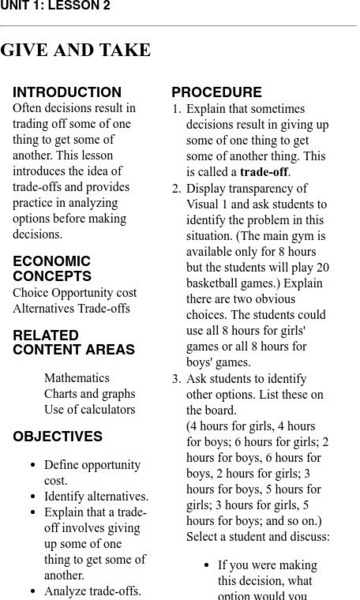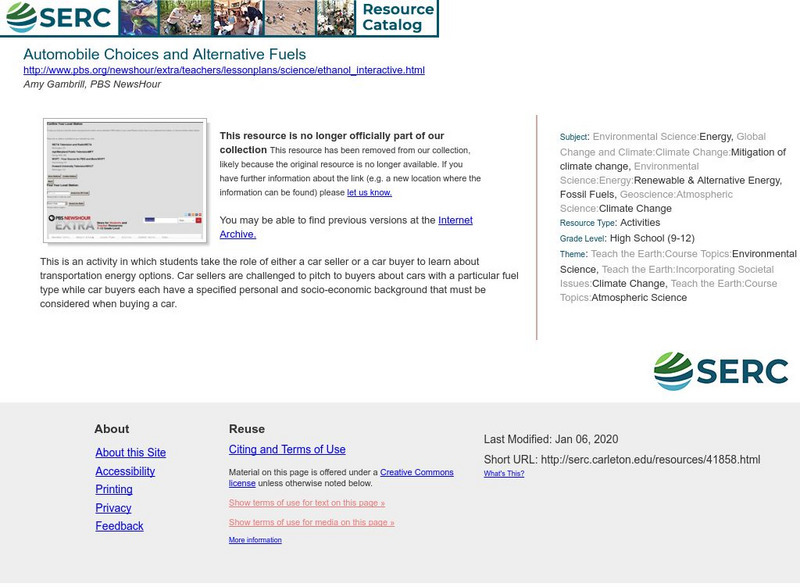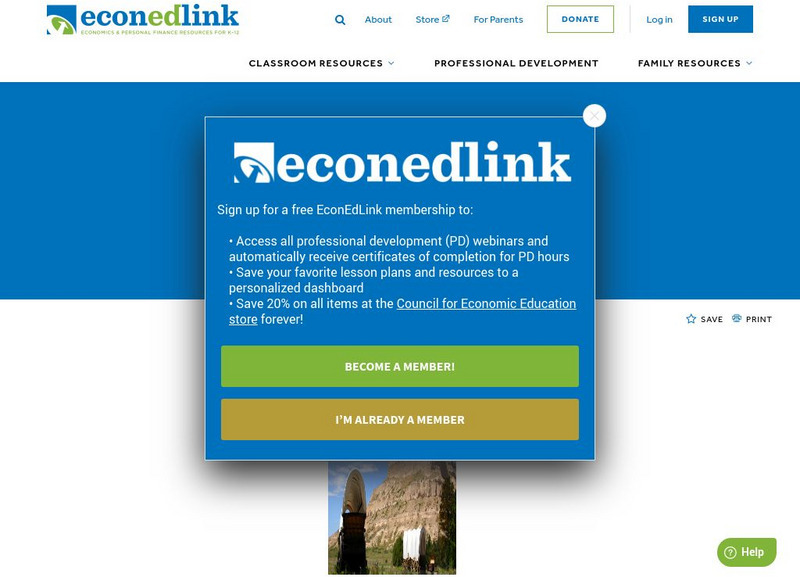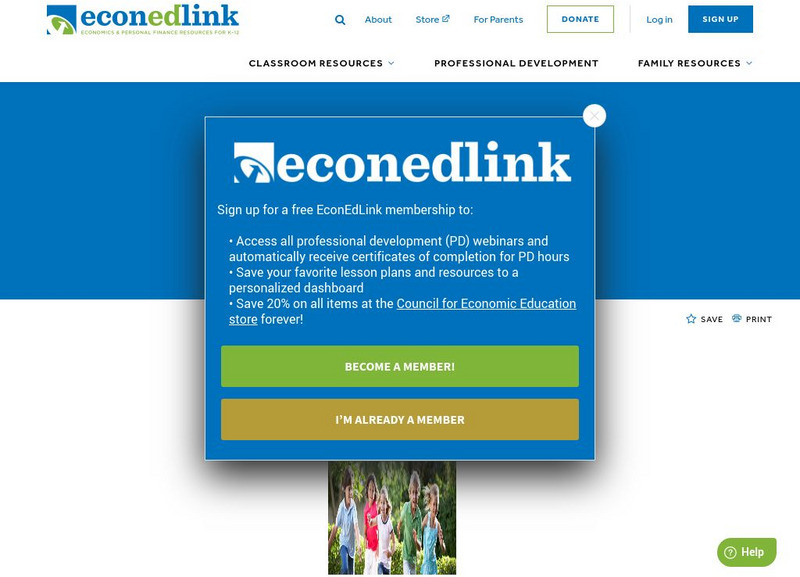Hi, what do you want to do?
Council for Economic Education
Econ Ed Link: Economic & Political Freedom (Grades 9 12)
In this lesson, learners analyze the concepts of economic freedom and political freedom, identify ways to measure them and explore the relation between measures of well-being and between measures of freedom.
Council for Economic Education
Econ Ed Link: Dumptown, Usa: Making a Ton of Difference
The amount of trash produced in the United States is mounting with each passing year. Communities are finding it increasingly difficult and costly to handle trash disposal. Recycling is considered a key solution to the garbage problem....
Council for Economic Education
Econ Ed Link: Booker T. Washington:"fifty Cents and a Dream"
Young Booker T. Washington had a dream. That dream was to use the resources at his disposal to earn the money necessary to get an education that would allow him and others to become financially secure. This lesson based on the picture...
Council for Economic Education
Econ Ed Link: The Economics of Voting
Since the 1960s, many Americans eligible to vote have not bothered to do so- not even in presidential elections. Low rates of participation in voting have been worrisome to people interested in preserving our democratic traditions....
Council for Economic Education
Econ Ed Link: Here's Your Chance to Make Millions in the Stock Market (Part 2)
In Part II of this lesson, students will have the opportunity to complete an interactive exercise that will take them on a historical tour of the stock market from 1920 until just after WWII. Students will learn the difference between a...
Council for Economic Education
Econ Ed Link: Here's Your Chance to Make Millions in the Stock Market (Part 3)
In Part III of this lesson, students will have the opportunity to complete an interactive exercise that will take them on a historical tour of the stock market from Post WWII through the year 2001. Students will learn the difference...
University of Nebraska Omaha
Ec Ed Web: Give and Take
A lesson plan from the University of Nebraska for Middle School middle schoolers about choice, opportunity cost, and trade-offs. Indicates standards, materials, objectives and is differentiated for one grade below and above grade-level...
Other
Michigan Department of Agriculture: Risks vs Benefits in Food Production [Pdf]
Michigan Department of Agriculture provides this site that teaches students about the risks and benefits involved with food production. Includes a detailed lesson plan along with a list of terms and definitions. Gives great background...
Science Education Resource Center at Carleton College
Serc: Automobile Choices and Alternative Fuels
This is an activity in which students take the role of either a car seller or a car buyer to learn about transportation energy options. Car sellers are challenged to pitch to buyers about cars with a particular fuel type while car buyers...
Council for Economic Education
Econ Ed Link: Marketplace: Real(ity) Estate
This lesson teaches students about opportunity cost through some steps of buying a house. It also shows students how advertising affects consumer decision-making.
Council for Economic Education
Econ Ed Link: Off to Interactive Island
This site is a lesson that teaches students about scarcity and choice. Students participate in a simulation where they are asked to make choices about what they want to take with them in order to survive.
Council for Economic Education
Econ Ed Link: Costs and Benefits of 'The Three Little Pigs'
Find out what the definition of a cost and a benefit is in terms of the economy when using this site. "When making a decision, learners should consider the costs and the benefits of that decision."
Council for Economic Education
Econ Ed Link: Are the Best Things in Life Free?
Students use economic reasoning to analyze the costs and consequences of choice. The idea that the best things in life are free is widely expressed as a maxim by people who know nothing of its origin. They know it's true through...
Council for Economic Education
Econ Ed Link: What Are Incentives?
Students will understand that incentives are used to encourage them to make good choices. After identifying incentives offered at home and in school, the students will distinguish between positive and negative incentives.
Council for Economic Education
Econ Ed Link: You Can Bank on This! (Part 2)
As in the first ', You Can BANK on This, you will learn that banking should not be confusing - it should be INTERESTING! Lesson Two will continue learning with Zing, but this time we will learn all about budgeting - and budgeting means...
Council for Economic Education
Econ Ed Link: There Is Something in the Water
The United States is losing 60,000 acres of wetlands each year. Is this good or bad? Does anyone really want to live in swamps, fens, bogs, and marshes? Or is it better economics to drain the wetlands for other purposes like agricultural...
Council for Economic Education
Econ Ed Link: Paraffin Alia
All resources are limited. It is this simple fact--scarcity--that forces us to make decisions. When we do make a choice, we pass up some other opportunity. Opportunity cost is defined as the next best alternative not chosen, or the...
Council for Economic Education
Econ Ed Link: The Mystery of Is It Mine or Ours?
Students will learn that people respond predictably to positive incentives (rewards) and negative incentives (penalties). They will identify incentives in their daily lives at home and school. Students will discuss which incentives have...
Council for Economic Education
Econ Ed Link: All in Business
This instructional activity on entrepreneurship can be used to help students understand what innovations are, and what it takes to get an idea off the ground. This instructional activity will take students through the process of...
Council for Economic Education
Econ Ed Link: Everyday Opportunities
In this lesson, students will learn about choices and opportunity costs that occur every day. While this lesson will go on throughout the day, the actual lesson is short.
Council for Economic Education
Econ Ed Link: Car Loan Project
Each student will buy (hypothetically) a car that will need to be financed. The student will need to look at different options and decide which will be the best choice for his situation. The student will need to find an advertisement for...
Council for Economic Education
Econ Ed Link: Business Ownership: The Franchise Option
Learners explore an alternative to starting a business from scratch- investing in a franchise. They begin by considering the pros and cons of a franchise and whether this form of business is an option that would fit their personality and...
Council for Economic Education
Econ Ed Link: You're Going to College
The students will explore the costs and the benefits of going to college. They participate in a three-part game designed to help them understand the decisions associated with attending college and the benefits available to college...
Council for Economic Education
Econ Ed Link: Break a Leg
In this lesson, students will learn about the basic components and terminology of individual health insurance. Students will make decisions about the value of insurance protection and you will identify trends in the cost of medical care...











